What is reassurance in a relationship? That is the question that came to my mind when a friend told me about her relationship woes. According to her, her man always leaves her feeling insecure. He told her that her need for constant reassurance was draining him. Before long, he seemed to switch off from her completely.
I was afraid to tell her that she had an unhealthy habit of constantly seeking reassurance. Not only from her partner but everyone else in her life. In fact, even her past relationship ended because of self-doubt, lack of self-love, low self-esteem, and always needing reassurance. This is brutally honest, and unfair too, but who wants to deal with an insecure partner all the time?
But seeing her distress, I set out to discover more about the role of reassurance in a relationship. Is it okay to actively seek it? How to ask for reassurance in a relationship when you need it? Is it healthy? What I discovered was quite insightful.
What Is Reassurance In A Relationship?
Table of Contents
Reassurance in a relationship is a partner’s act of providing comfort, support, and validation to their loved one. The right dose of reassurance is critical to maintaining a healthy relationship and creating a safe environment for them. You just need to know the things to say to reassure your partner. Or it could make things worse.
So, why is reassurance important in a relationship? The aim is to:
- Alleviate any doubts, insecurities, or fears
- To communicate love, care, and commitment
- To build trust and strengthen the emotional bond
- To foster a sense of security and openness
Related Reading: Dealing With An Insecure Boyfriend? Here Are 16 Coping Tips
Types of reassurance in a relationship
For my friend, it has always been about external validation in order for her to feel self-assured. The less reassurance she gets, the less she feels secure. But there are other types of reassurance in a relationship that she, and many people, need:
- Verbal reassurance: This can be in the form of affirmations where the partner expresses love, appreciation, and positive words to reassure the partner of their feelings and commitments. It can also be in the form of open communication about concerns, emotions, and future plans
- Physical reassurance: A few physical examples of reassurance in a relationship are touch, kisses, hugs, and other types of affection. Physical touch is a love language whose aim is to convey a sense of closeness and security
- Time and attention: These are important types of reassurance in a relationship too. Spending quality time together and engaging in shared activities can improve the connection between partners. There’s also the aspect of listening and showing empathy that shows your partner values your thoughts and feelings
- Acknowledgment: It means validating a partner’s feelings, perspectives, and experiences. Such emotional validation is important in relationships to show love and respect to your partner
- Consistency: A reliable and predictable partner is trustworthy and brings a sense of stability to the relationship
- Support: This takes many forms, including emotional support during challenging times. There is also collaborative effort in problem-solving, thus the assurance that you are a team
- Commitment: Committing to a long-term relationship provides reassurance of a good future
Related Reading: The 5 Types Of Love Languages And How To Use Them For Happy Relationships
Many folks in a hyper-independent world think it’s wrong to admit that “I need reassurance in a relationship.” But this comfort is your right. In fact, a lack of reassurance in a relationship can be a problem. It’s excessive reassurance-seeking, though, that comes with challenges. And that brings us to the important question: “Is it bad to need reassurance in a relationship?” Before I answer that, let’s differentiate between healthy and unhealthy reassurance.
| Healthy reassurance | Unhealthy reassurance | |
| Purpose | To seek comfort, support, and validation | To manipulate, control, or exploit the partner |
| Frequency | Not a lot. Even if it’s asked for on a regular basis, it’s not excessive or unreasonable | This reassurance is asked for all the time, and for minor things too |
| Specificity | Specific and tailored to your needs | General and vague |
| Timing | Healthy reassurance is asked for when your partner is emotionally and mentally available to give comfort | It’s asked for at inopportune times or when your partner is going through their own crisis |
| Sincerity | Genuine and heartfelt | Fake or manipulative |
| Impact | Makes you feel loved, supported, and valued. Makes your partner feel closer to you | Doesn’t satisfy you at all or for long. And makes the giver of reassurance feel controlled and drained |
For people who wonder, “Why is reassurance important in a relationship?”, I hope this table helps address that thought. We cannot let our partners suffer through a complete lack of reassurance in a relationship and then call them “clingy,” “too sensitive,” or “too demanding.”
Validation vs. reassurance: Difference
Well, both are important in a healthy relationship. However, there’s a slight difference in meaning and usage. Validation is understanding and acknowledging someone’s feelings. There’s active listening and empathizing. Your partner will feel understood and accepted as validation strengthens emotional well-being and boosts your partner’s self-esteem.
Reassurance is providing support and comfort to someone who may be feeling anxious or insecure. Examples of reassurance in a relationship include tons of positive affirmations, words of encouragement, and gestures of affection. The receiver ends up feeling relieved, secure, supported, and valued.
Why do I need constant reassurance?
Needing reassurance in a relationship is not a bad thing. But it becomes unhealthy when no amount of it satisfies a person properly. There can be different reasons for you to need constant reassurance including attention-seeking and emotional manipulation. other reasons are:
- A lack of self-worth or a low self-esteem
- Past experiences in romantic relationships
- How you bond with other people or your attachment style
- Your partner may truly be neglecting your valid needs
- Or they might be giving you the kind of reassurance that manipulates, not comforts
Studies show that excessive reassurance-seeking can be detrimental to one’s happiness in a relationship. The seekers will make every effort to maintain the relationship with their partner, often for the sake of their happiness.
In trying to understand my friend, I knew one of the reasons for her constant need for reassurance came from her past experiences. Her self-worth took a major beating because a former partner’s affection was given in doses. However, a Reddit user has an interesting opinion, which may or may not resonate with you: “Reassurance will mean more if you don’t ask for it. In the long term, if he randomly texts you, let that reassure you. Because if you ask him for reassurance regularly you’ll start to think he’s only saying these things because you asked.”
Related Reading: 11 Ways An Insecure Partner Drains A Relationship And 5 Ways To Fix It.
Understanding attachment styles and their impact on seeking reassurance
An attachment style refers to how we form and maintain emotional bonds with others; this is rooted in the attachment formed in childhood with our primary caregiver(s). So, what are the different attachment styles in relationships?
Secure attachment
Secure attachment is characterized by trust and comfort in the romantic relationship. There is a balance between independence and closeness between the two partners. Someone with a secure attachment style is self-assured and not afraid to seek reassurance.
The need is not constant because they tend not to have too much anxiety or fear of abandonment. But that is not to say they don’t want occasional reassurance from their partners. For them, open communication, physical touch, verbal affirmations, emotional/physical availability, and collaborative problem-solving are how they seek comfort.
Related Reading: 12 Signs Your Past Relationships Are Affecting Your Present Relationship
Anxious attachment style
Anxious attachment style in relationships is characterized by fear of abandonment, negative intrusive thoughts, and a strong desire for excessive closeness. Indeed, a study shows that certain attachment styles can impact excessive reassurance-seeking behavior. This perfectly describes my friend. The less secure partner always seeks approval and is highly sensitive to the relationship dynamics. They also tend to seek excessive reassurance from external validation, and most suffer from relationship anxiety.
Fearful/disorganized attachment
This attachment style combines avoidant and anxious tendencies. The individual may desire closeness, but fear of rejection will keep them away. In romantic relationships, such individuals have a hard time building trust and may not be good at emotional regulation.
Their lack of trust makes it difficult for them to seek validation at all. They may display ambivalent behavior or send mixed signals. One minute they may desire affirmation, the next they are pushing you away. Direct communication can be tough for them, even if they desire reassurance. Plenty of verbal affirmation is necessary to keep them feeling safe.
Dismissive/avoidant attachment
An individual with a dismissive/avoidant attachment downplays the importance of emotional intimacy. They can also be quite uncomfortable with closeness and value self-reliance and independence. In romantic relationships, they tend to not seek emotional support and prefer to deal with their own issues.
For instance, my friend’s boyfriend always prefers to do things on his own. So, it leaves her feeling like he doesn’t value her input or company. It’s interesting how the two are so different. Individuals with dismissive attachment seek reassurance through their partner’s actions. You must value their need for autonomy and independence, so respect their boundaries. Take note of their nonverbal cues because they may not use words to express themselves. For them, maintaining distance during emotionally trying times allows them to self-soothe, so respect that.
Related Reading: Insecure Attachment Style In Relationships: Causes & How To Overcome
Is It Okay To Ask For Reassurance In A Relationship?

There is absolutely nothing wrong with it. Seeking reassurance is a fundamental way to communicate your needs to your partner. It helps prevent misunderstandings and can build a more compassionate foundation for the relationship.
When we feel reassured by our partner, we feel loved, supported, and accepted. This can lead to more fulfillment and happiness, which are the characteristics of a healthy relationship.
When is it okay to ask for reassurance in a relationship?
It’s okay (and natural) to ask for reassurance in the following scenarios:
- In times of uncertainty or major life changes — It helps to know that you’re not alone in coping with the unfamiliar
- When you are grappling with personal insecurities or self-doubt — It helps in confidence-building and navigating the emotions you’re feeling
- During significant transitions in the romantic relationship, like when discussing long-term commitments or moving in together — It gives you a sense of safety about the future you are building together
- After a disagreement or conflict — To know that the relationship is still stable
- When expressing emotional needs — To know you’re supported and understood while being vulnerable
- When building or rebuilding trust. For instance, if your partner cheated on you — It’s okay to seek reassurance that he is committed to the relationship
Related Reading: Love Vs Attachment: Is It Real Love? Understanding The Difference
When is it not okay to ask for reassurance in a relationship?
Do not seek reassurance in the following conditions:
- When there’s excessive dependency, not to be confused with relationship interdependence, or a constant need for reassurance for every minor thing, like “Are you sure you like this outfit?” even though you’ve asked and confirmed a couple of times already
- When you’re attempting to manipulate or control your partner
- When you place unrealistic expectations on your partner. Offering reassurance should come naturally for your partner and not because you demand it
- When you ignore their boundaries, especially when your partner asks for space
- When you avoid personal growth by relying on reassurance or third-party validation to deal with personal insecurities
- When needing constant reassurance replaces open communication. This can lead to relationship anxiety for both of you, which can be emotionally draining
- When it’s a substitute for not resolving underlying problems
Seeking reassurance is not about weakness or insecurity. It can be healthy and can also qualify as self-care because it puts you in a positive emotional state. However, it can be unhealthy when it becomes excessive, manipulative, or too demanding. Try to deal with any underlying issues through self-reflection, journaling, and open communication. Also, if necessary, seek professional support to get over past trauma.
Related Reading: Why Does Love Hurt So Much and What to Do?
How To Ask For Reassurance In A Relationship — 9 Ways
In fairness, not everyone in a romantic relationship knows how to navigate the nuances that come with being in one. So, it’s okay if you don’t know how to ask for reassurance from your partner. Here’s how you can go about it:
1. Be direct and specific
No beating about the bush on this. From the get-go, I always tell my partner, “When you tell me you love me before you leave for work, it makes me feel secure.”
2. Be open and honest when you seek reassurance in a relationship
Don’t be shy about expressing your feelings and sharing concerns with your partner. Healthy communication is critical here. So, if you need your partner’s affection in the present moment, don’t be afraid to tell them. If you need them to spend quality time with you, tell them. “Hey, I need more quality time with you. From that, I mean, can we just sit and talk over wine tonight, without our phones? Or watch our favorite movie together?”

3. Use “I” statements and a question
Make the need for reassurance clear by personalizing it. This will help your partner understand your perspective and any emotional boundaries you have. When seeking reassurance, ask thoughtful and open-ended questions for better communication and understanding. You can use (and customize) this list of questions to ask for reassurance in a relationship:
- I have been feeling a bit uncertain about our relationship lately. Can we have a conversation so that I can let you know what is troubling me?
- I need to be on the same page when it comes to our commitment to this relationship. I need to feel assured regarding this, can we schedule some time to discuss our long-term goals and plans together?
- Open communication is very important to me in a healthy relationship. What are your thoughts on this, and what can we do to improve?
- I have been dealing with stress at work and really need your support. Can you make some time for me to share what I’m going through?
4. Avoid blaming or accusing your partner
Don’t resort to blaming your partner for their lack of reassurance. The only result will be to make them defensive and less likely to engage. Blame-shifting harms relationships in so many ways. Remember, you may not always get the exact reassurance you are looking for, so be willing to meet your partner halfway, especially if they are only now learning more about you.
5. Focus on the present moment
Past issues do not have a place when expressing your need for reassurance. A healthy form of communication is to focus on the here and now. Your partner’s presence or availability to talk things through should be enough of a sign that they value you.
But if it’s past trauma that makes staying completely in the present impossible, please take time to heal through your partner’s patience and support. Therapy and support groups can also help overcome any emotional baggage you may be bringing into the relationship.
Related Reading: Accountability In Relationships – Meaning, Importance, And Ways To Practice
6. Frame the sentences positively when you ask for comfort
Be positive about how you seek reassurance. Say, “I love it when you remind me how much you love me.” That sounds more constructive than “I don’t think you don’t love me anymore.”
7. Ask for reassurance in a relationship in a positive context

It’s important to reflect on why you need reassurance and whether it fits a specific context. Like, “I am thinking of going back to school, and I need to know that you will support me.” And is reassurance healthy to seek at any time of the day? No, choose the right time and place. Your partner will not be in the right mental state to give you glowing tributes when they have just flunked a career-changing exam. Wait until they are less stressed or distracted to broach the subject.
A Reddit user has this to say on how often you should ask for reassurance. “As often as you need the reassurance, but a healthy relationship usually includes both parties reassuring each other through words AND actions of their love. So, regular assurance of the relationship should happen naturally.”
8. Be open to receiving reassurance
You may need less reassurance because of your attachment style. But if your partner provides you with comforting words/acts, even when you don’t particularly need them, express gratitude. Let your partner know when their words or actions make you feel loved and supported. making your partner feel valued is one of the fundamentals of support in a relationship.
Make sure your partner is open to reassuring you when you approach them. Don’t interrupt them when they are busy doing something else and complain that they don’t love you. Give them time and space to relax, then ask for what you need. Also, try gratitude journaling. Writing down what you are grateful for will make you better appreciate your partner’s reassuring words. Individual therapy can also help determine the root cause of why you shy away from receiving validation.
Related Reading: When A Good Marriage Is About Supporting Your Partner
9. Seek professional help if needed
If your partner cannot give you the type of reassurance you need, or meet the frequency of it, you can seek therapy. A therapist can help you understand your needs and the reasons behind them. They can guide you on how to communicate more effectively, deal with a negative spouse, and develop healthier coping mechanisms. You can be sure of a happier relationship going forward because you will have the necessary tools to build yourself up.
How Not To Ask For Reassurance
Many people wonder, “What if my partner is unable to provide the reassurance I need?” Then you can discuss what you need with your partner and work on the specifics together. And be patient as they learn the ropes. Or if this is a deal-breaker for you, then you can choose to part ways.
However, take note of the following pointers on how NOT to ask for reassurance from your partner. Bad communication could be the reason why the way you ask for it has been backfiring all along. The following things don’t help your cause:
- Using passive-aggressive statements like “I guess you don’t love me anymore”
- Resorting to accusatory language like “How come you don’t reassure me nowadays?”
- Assuming negative intent like “You must really not care for me”
- Always fishing for reassurance even in regular conversations
- Ignoring previous reassurances and repeatedly asking for them
- Comparing how your partner supports you with how they show up for others
- Giving ultimatums: “If you truly love me, you would…”
In short, be mindful of your partner’s needs, don’t overstep boundaries, and take responsibility where necessary.
Key Pointers
- Is reassurance healthy? Yes, it is. Reassurance in a relationship can strengthen the bond between the couple, help them know each other deeply, and is a recipe for healthy relationships
- Is it okay to ask for reassurance in a relationship? Yes. A lack of occasional reassurance in a relationship can end it. It shows a lack of support, love, and caring
- On how to stop needing reassurance in a relationship all the time, we suggest that you work on your self-worth and self-esteem. First, be okay with who you are without needing external validation all the time
- Knowing how to ask for reassurance in a relationship requires open communication, honesty, willingness to compromise, and the right timing
You should be able to communicate your needs in a safe environment. And being open to receiving reassurance (and providing it) will help you build a stronger, more fulfilling relationship with your partner. But watch out for the signs of excessive reassurance-seeking behavior. It shows a sure lack of self-confidence.
If you want to know how to stop needing reassurance in a relationship all the time, it’ll need effort on your part. So, develop self-love, let go of baggage from past relationships, and consider your partner’s feelings as well. Small moments of self-care and self-love will have a huge impact on your healing. Also, seek professional help to deal with past traumas or anxious attachment styles.
Retroactive Jealousy: Understanding The Causes, Triggers, And Coping Tips
55 Motivating Words Of Encouragement For A Man You Love During Hard Times
Your contribution does not constitute a charitable donation. It will allow Bonobology to continue bringing you new and up-to-date information in our pursuit of helping anyone in the world to learn how to do anything.

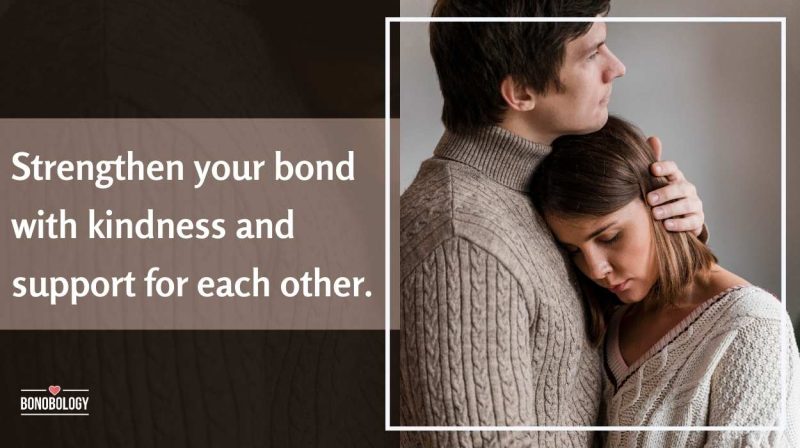



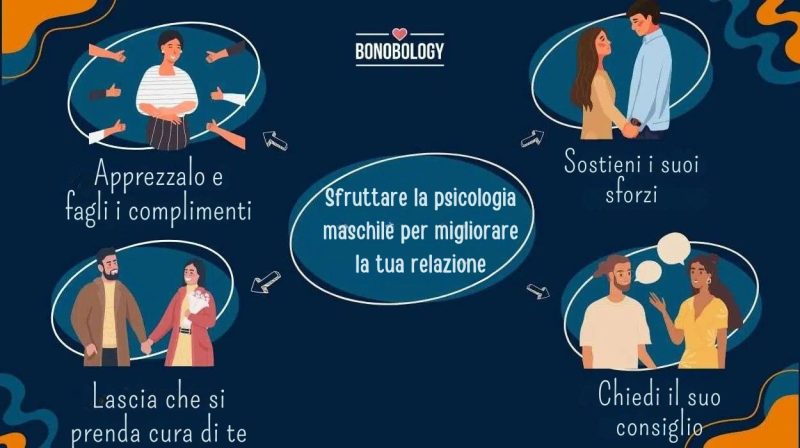

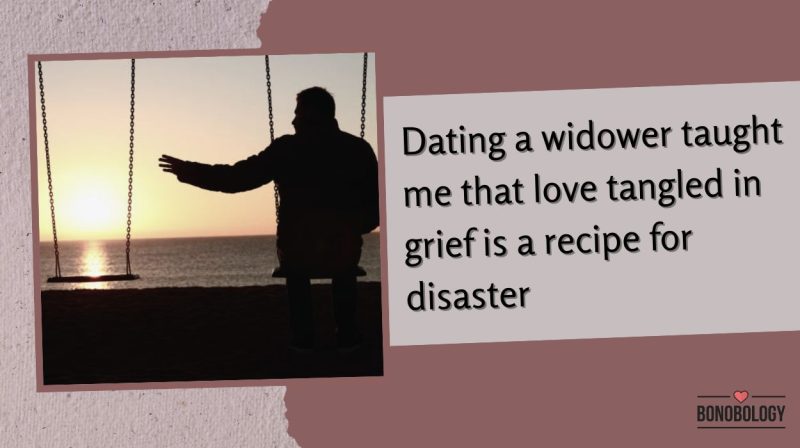

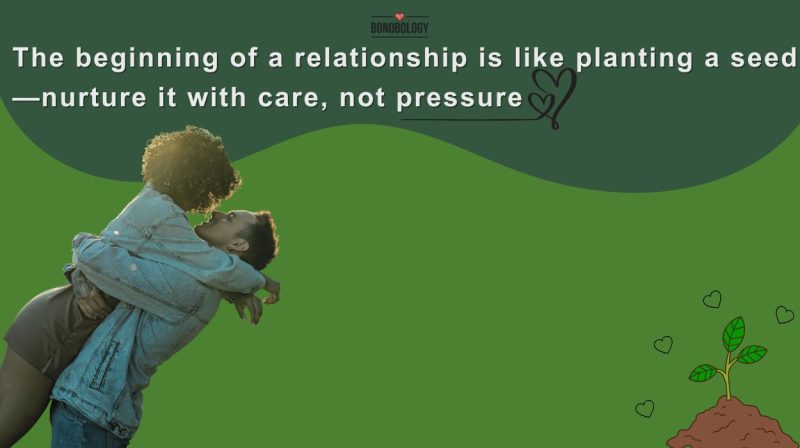
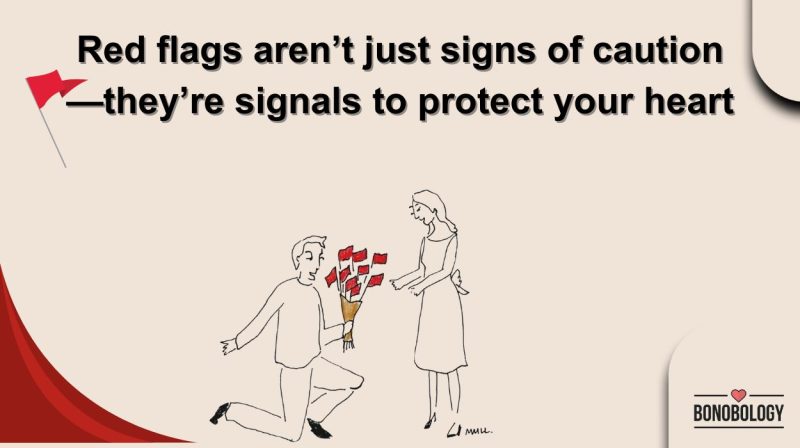

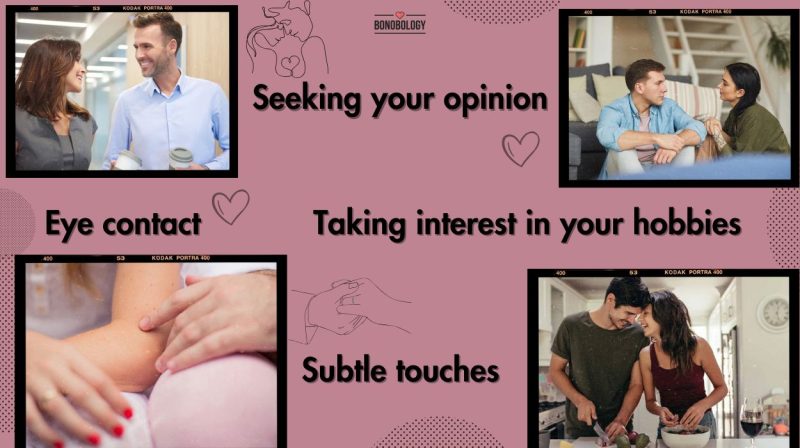

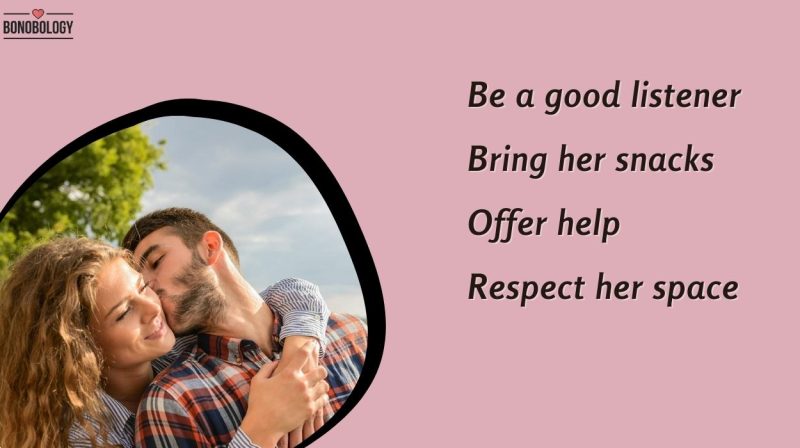
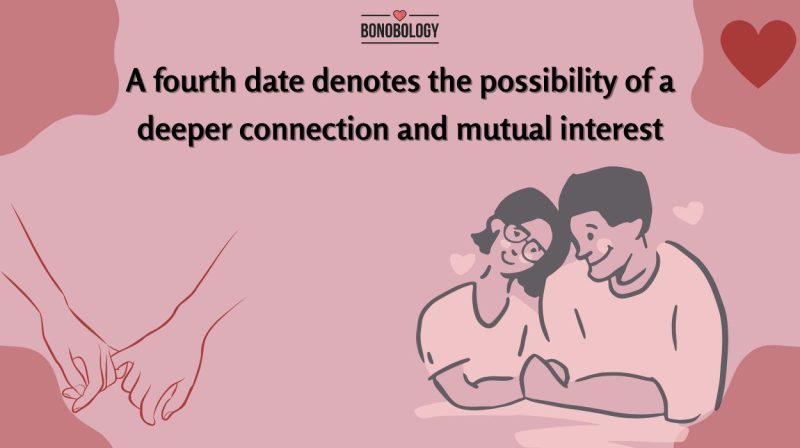
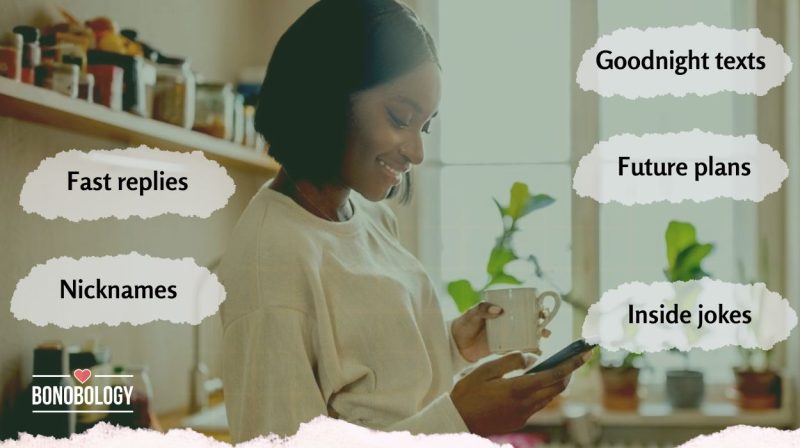
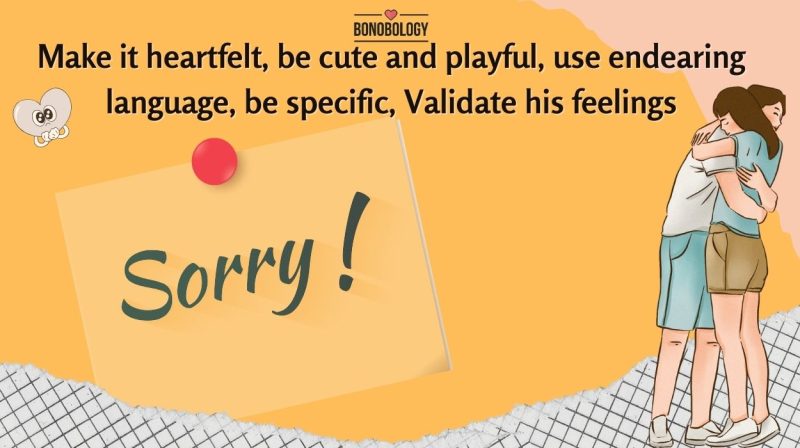
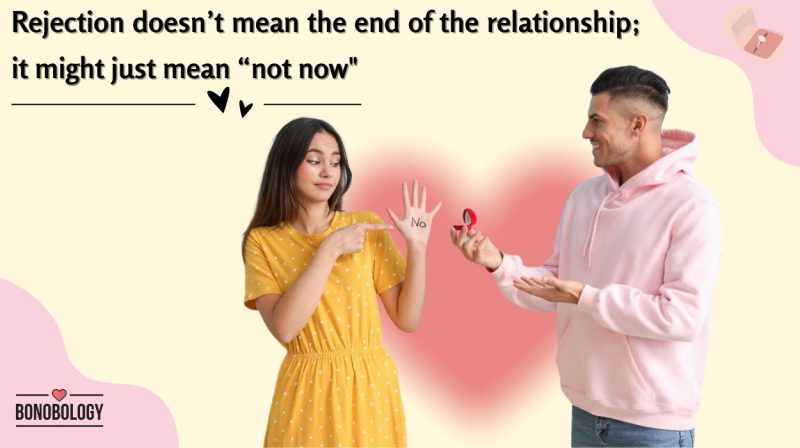



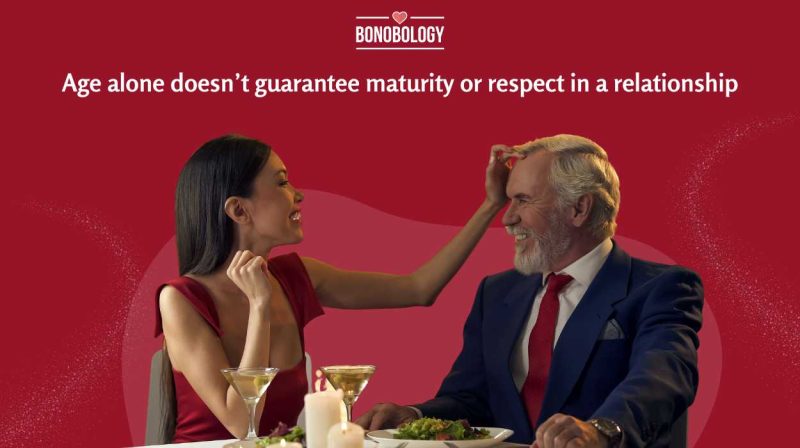
Featured
161 Weird Questions To Ask Your Boyfriend And Get Him Talking
Erkekleri En Çok Tahrik Eden 13 Şey Nelerdir?
Istinto da Eroe negli Uomini: 15 Modi per Attivarlo, con Esempi
75 preguntas trampa para hacerle a tu novia
Why I Will Never Date A Widower Again -A Woman’s Story
How Long Should You Date Before Getting Engaged
Dating Guide: 9 Things To Never Do In The First Month Of Dating
11 Red Flags When Dating A Separated Man | Don’t Ignore These
152 Most Stupid Pickup Lines of All Time | AVOID THESE At All Costs
21 Clear Signs Of Unspoken Attraction Between Two People
How To Compliment A Guy: Tips And Examples
How To Comfort Your Girlfriend: 15 Simple Tips (With Examples)
Your Guide To Getting The Fourth Date Right
15 Delightful Signs The Talking Stage Is Going Well
How To Say Sorry To Your Boyfriend Through Text
My Girlfriend Rejected My Proposal: What Should I Do?
When And How To Ask For A Second Date
How To Get Over Infatuation: 17 Psychological Tricks
How To Talk Intimately With Your Boyfriend Over Text—15 Easy Ways
13 Red Flags When Dating An Older Man | Don’t Ignore These